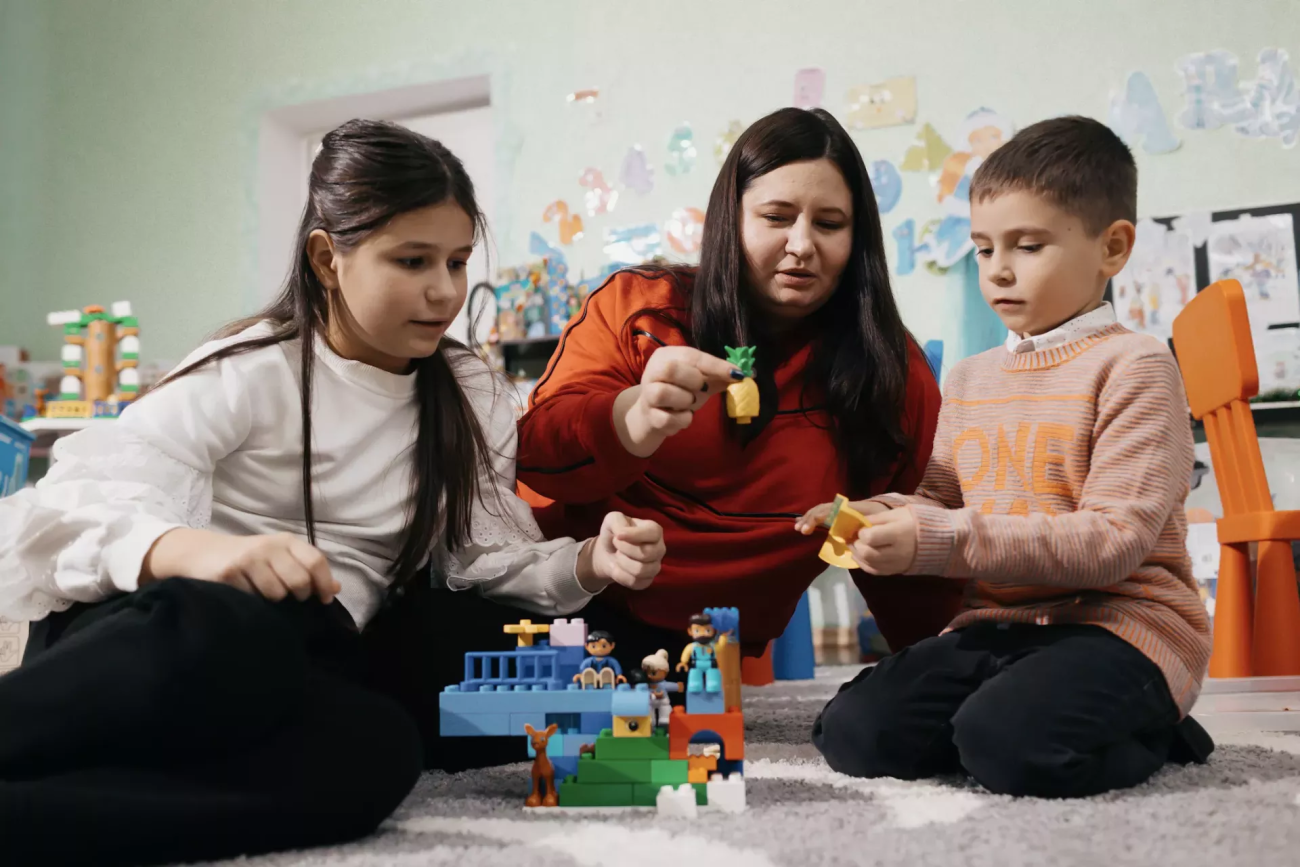Through play, Eva and Misha from Ukraine are reimagining their childhood in Moldova

"Play is the most effective form of learning. Interacting with other children and playing with the LEGO bricks fosters creativity and enhances their well-being"
At just ten and six years old, Eva and Misha have already experienced the ache of longing for their homeland and native language. For two years, they did not lose hope of hugging their grandparents again, strolling along the seaside, and returning to their school, just as before February 24, 2022, when the lives of millions of Ukrainian children changed.
Eva and her younger brother are from Odesa, and for nearly seven hundred days, they found peace in Balti alongside their mother, Tatiana. "The war changed our entire lives. I was on maternity leave and planned to return to work. We purchased our dream home, and we enjoy walks along the seaside every day. However, we were forced to leave to safeguard our children and protect them from potential psychological traumas. For sure, the sound of sirens has an impact on children's mental health," Tatiana recalls about the onset of the war.
She does not cry or seem sad. You can feel the joy of life in her eyes. Two years after finding refuge in Moldova, she realized that only her children's safety matters. "I want to return home, but I understand we must live in the present. Misha adapted easily to kindergarten. However, the older child struggled with online learning; I noticed she had become solitary due to limited interaction with other children. That is why my daughter started to attend the local school," Tatiana shares.
Eva confirms her longing for school activities and interaction with her classmates. " At school, you move around, socialize, and learn new things," says Eva. She dreams of being a singer and wants to perform a Ukrainian song for us. "I like the school here. I've made friends, but Ukrainian schools are special because I can speak my language there," Eva shares emotionally. In Moldova, she takes music lessons, nurturing her talent: "If I become famous, I'll write songs and inspire people." After school, Eva joins her brother Misha at the play and learning hub, established by UNICEF and its partners, within the kindergarten where Misha continues his education and makes new friends. Today, the two siblings and other children from Moldova are enjoying the LEGO bricks provided by UNICEF, with the support of the LEGO Foundation.
Under the guidance of educators, the children immerse themselves in creativity. "When the children return home, they tell me, 'Mom, today we built a castle; today we built a car'. I believe play is the most effective form of learning. Interacting with other children and playing with the LEGO bricks fosters creativity and enhances their well-being. Away from home, they need to play and enjoy life more than ever," Tatiana remarks.
The activities organized at the play and learning hub promote the social inclusion of children, especially those who require the most support. Here, they develop essential skills for easier integration into the Moldovan educational system. Since the onset of the war, UNICEF, together with the Government of Moldova and non-governmental partners, and with financial support from the LEGO Foundation, has established 36 play and learning hubs across all regions of Moldova. Also, more than 280 kindergartens in Moldova have been equipped with LEGO® play boxes, and around 1,500 educators were trained to integrate them effectively into educational activities.
Natalia, a psychologist, is one of the participants in the training programme. She believes LEGO® play boxes are valuable aids for educators and specialists striving to ensure social inclusion and healthy development for all children. "Here, we have an oasis where children can be children. They can build anything they desire. For instance, some children built a time machine to see their grandmother’s childhood. These activities help them to feel better. If a child is sad, we identify the cause and help them overcome it. They engage with other children during the building process and forget their problems," explains Natalia.
The play and learning hubs are safe spaces not only for children but also for mothers. When Tatiana feels unsettled, she knows she can discuss any issue with the educators and counsellors at the centre and receive the support she needs. "We have everything for our integration. Whenever something concerns us, the educators offer guidance and assist us in finding solutions to all challenges, even those concerning our daily life in Balti," says Tatiana.
To date, around 116,000 refugees from Ukraine are in Moldova, including more than 51,000 children. Since the onset of the conflict, UNICEF has partnered with the government to ensure all refugee children are integrated in formal and non-formal education programmes. More than 24,000 children from Moldova and Ukraine have benefited from access to non-formal education activities organized at play and learning hubs, established by UNICEF.



